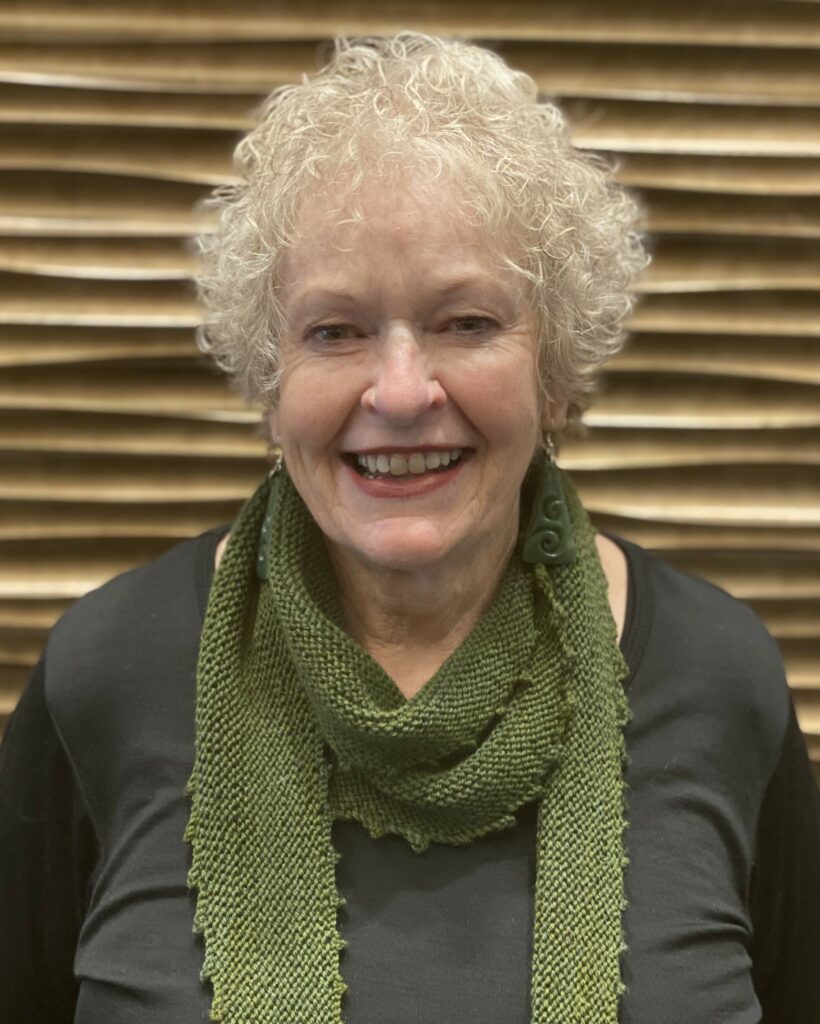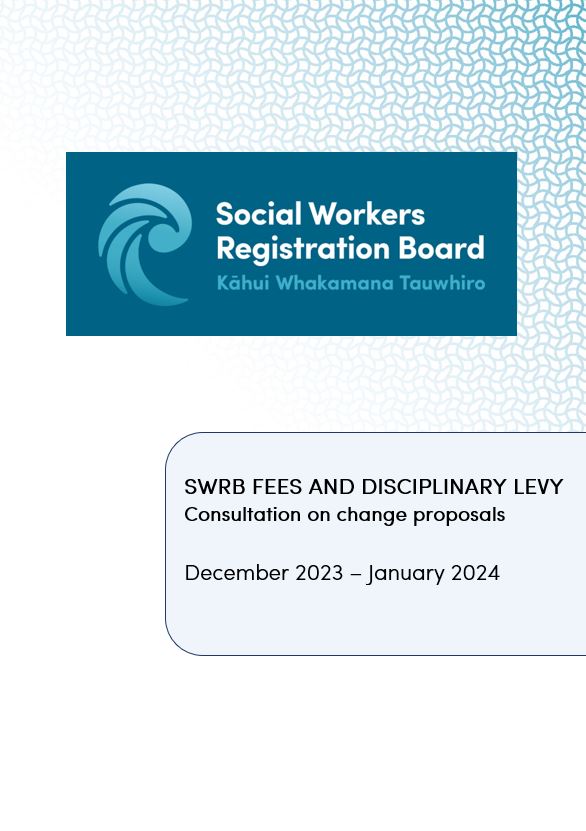He ara pūkenga, he ara tauwhiro, hei whakamana mātā waka
The many pathways of knowledge, the many pathways of social work, upholding the dignity of all
Ngā mihi o te Tau Hou!
While we are still in January, I trust it is early enough in the season to wish you all a very happy New Year!
Although we are only three weeks into 2024, we already have plenty of updates for you in this Onboard. At the beginning of the year, we were delighted to hear our Board member Rose Henderson was awarded an Officer of the New Zealand Order of Merit in the New Years Honours List for services to social work and health. It was lovely to receive this positive news as we returned to the office.
Another recent highlight has been hosting visitors from South Australia who will be setting up the first social work registration board in the country. They have only 18 months to prepare for mandatory registration and have been eager to learn about our history, policies, and procedures as we support them in their journey. It has been a fascinating opportunity for us to reflect on the maturing of the SWRB following the introduction of mandatory registration here in 2021. While we know there is more to do, we have come a long way since then.
One of the areas we are focusing on is providing tools and guidance to promote high standards of practice – which is one of the functions of the Social Workers Registration Act 2003. At the end of last year, we published new resources for social workers on the Code of Conduct in practice – and share some themes emerging from our disciplinary processes. We welcome feedback on these guidance notes as we will be developing additional resources over the coming months and would love to hear about the areas you think are important to cover. More information on how to get involved can be found in the newsletter below.
We have various other updates for you relating to registration, CPD and publications, but one final thing to mention is the ongoing consultation on SWRB fees and the disciplinary levy. The closing date for this has been extended to 7 February so there is still time to make a submission. Thank you to everyone who has engaged in the consultation to date – we appreciate you taking the time to share your views.
Sarah Clark
Chief Executive

Board Chair Shannon Pakura, Sarah Clark, and Hamish McDouall with Sarah Wendt, Louise Butler, and Hayley Anderson at the SWRB office
Australia’s journey towards registration
South Australia will become the first state in Australia to establish mandatory social work registration. At the SWRB, we welcomed the team from Adelaide who are tasked with implementing recently passed legislation to ensure that all social workers are registered from July 2025.
The legislation is aligned with its New Zealand counterpart – indeed it is mentioned specifically in the South Australian Social Workers Registration Act 2021 in relation to scopes of practice. We were privileged to be able to share our experience with them – from practical information about how MySWRB works, to the nature of the Board and decision-making processes. They met with individuals from different teams as well as with Board Chair Shannon Pakura and the Chief Executive.
There is a lot of support from social workers in Australia for registration – to increase the standing of the profession and for more effective protection of the public. It is hoped that other states will follow suite, leading to a national registration board over time.
From what we have learned about the team, setting up social work registration in South Australia will be in good hands.
Sarah Wendt, Director of South Australia’s Social Worker Registration Scheme has an extensive social work background. A professor of social work, she has practice experience in domestic violence and work with First Nations people and communities.
Sarah recruited the second social worker on the team – Louise Butler, Principal Policy Advisor. In addition to practice experience in child protection and disability and work as an academic, Louise has knowledge of regulation having worked as a social worker under the UK regulatory system and more recently as a Director of the National Disability Insurance Scheme (NDIS) Quality and Safeguards Commission in South Australia.
The third member of the team is Senior Project Officer Hayley Anderson who brings substantial government and project experience to her role in establishing the office and setting up systems.
We have enjoyed our kōrero and hearing about the ambitious programme of work ahead for the team. In Aotearoa we had the advantage of establishing voluntary registration first before mandatory registration was introduced with the associated higher workload of registering many people in a short period. South Australia has around 4,200 people in social work roles, but in just eighteen months they need to be ready to register them all.
The discussions also allowed us to reflect on the size and scale of our own journey here in Aotearoa. While we have achieved much, we were able to share with them that we know there is more we can do to enhance the profession as we lift our own performance as a regulator. We look forward to keeping in touch and learning from their experience as they are learning from ours.
Rose Henderson named on the New Year Honours List

The SWRB wishes to acknowledge and congratulate SWRB Board member Rose Henderson for her inclusion in the New Year Honours list 2024. Rose was awarded an ONZM – Officer of the New Zealand Order of Merit – for her contributions to social work and health.
Rose Henderson has been a Board Member of the SWRB since 2019 and has a long history in the social work profession. She has been a Director of Allied Health at Te Whatu Ora since 2009 and has provided clinical leadership in various disaster response and recovery roles.
Rose has made significant contributions to social work in New Zealand and internationally through voluntary governance roles. She was President of the Aotearoa New Zealand Association of Social Workers (2003-2009, 2016), and is now a Life Member. During this time, she was instrumental in the establishment of the SWRB in 2003.
Rose is also a Past Vice-President of the International Federation of Social Workers (IFSW) and Immediate Past President of the Asia-Pacific region of IFSW.
SWRB Chair Shannon Pakura expressed her pleasure that Rose’s contribution to the social work profession has been acknowledged. “Rose has been at the forefront of national and international social work for many years. She has always ensured that Aotearoa’s social work voice is heard and valued by others. Congratulations Rose – thank you for the significant contribution you have made to our profession.”
You view the list, including Rose and her fellow recipients here: New Year Honours List 2024 – Citations for Officers of the New Zealand Order of Merit
CPD audit update
In February, we will be starting our audit of social workers’ Continuing Professional Development (CPD) logs for the 2022/23 practising year. This is an annual audit of 5% of all practising registered social workers’ CPD logs, randomly selected, for the period July 2022 to June 2023. If you are one of the selected social workers, you can expect an email from us in the next few weeks detailing how to submit your log.
There are several important changes implemented for this year’s audit:
- All social workers selected for the audit are required to submit their CPD log using the MySWRB platform. Social workers will only be able to record their CPD using the online log.
- As part of this adjustment, the current tab that facilitates the upload of Word or PDF documents will be discontinued on MySWRB.
- Despite the removal of the upload tab, you will still be able to access your historical documents uploaded to MySWRB.
The SWRB no longer requires evidence of critical reflection in the CPD log. The decision to remove the reflection was prompted by the Board’s wish to lessen the burden on social workers and reflects the feedback we received from our CPD audit survey. The SWRB does recognise that critical reflection is an essential aspect of social work practice. In the log, the column for reflection is available for those who wish to use it, but it is optional and will not be audited. Individual feedback will no longer be provided to each audited social worker due to removing the reflection requirement.
A reminder that the Board’s annual CPD requirements are:
- Linking your activities to the ten core competencies to keep your practice current.
- Including an activity supporting your competence to work with Māori.
- Completing at least 20 hours of CPD during the year.
For social workers new to using MySWRB, we will be providing additional tools to help you log your CPD onto your account.

Experience pathway: S13 applications – Final call?
The Experience Pathway: S13 is a route to registration for people who have been working in social work for a significant number of years, but who do not have an SWRB-recognised social work qualification. The Experience Pathway is provided for under section 13 of the Social Workers Registration Act 2003.
Section 13 of the Social Workers Registration Act is due to be repealed on 28 February 2024. This means that applications for this registration pathway must be submitted by 27 February 2024. Applications received after 27 February will not be processed.
While there is a Bill currently before the House which could extend the pathway for a limited time, if you or any of your kaimahi are interested in applying then we strongly suggest applying before the 27 February 2024. Please note this includes paying the application fee.
You can find out more about the pathway on our website: https://swrb.govt.nz/registration/experience-pathway-s13/
If there are any changes to the status of the experience pathway, we will update the website accordingly and include in our next newsletter.
New Resources for social workers
The Social Workers Registration Board is undertaking an exciting project to develop resources which will enhance social workers’ practice. Funding for this project was announced in the Government’s Wellbeing Budget 2022.
The first output of this project has been the development of four ‘Code of Conduct in Practice’ resources. These guidance notes provide advice about maintaining professional standards of integrity and conduct on different topics such as social media use, maintaining personal boundaries, supervision, and social work records. The resources we’ve developed so far can be found here: https://swrb.govt.nz/about-us/resources/
The next part of this project is to design resources which will assist in understanding:
- what regulation is
- why regulation of the social work profession is important
- what your responsibilities are as a regulated social worker
- how to apply the regulatory elements in your social work practice.
We are also developing information to provide to consumers of social work services defining what they can expect from a registered social worker.
Request for Focus Group Participants
As part of the design process, we would like to involve social workers to test prototype resources (including the Code of Conduct in Practice resources) as part of focus groups so we can ensure that what is produced will be useful for you. This is a great opportunity to be part of a new initiative to benefit yourself, your colleagues, and newcomers to social work.
CPD Opportunity
Since the focus group discussions will centre around regulatory elements such as the Code of Conduct and the Core Competence Standards, participation in a focus group will count as a Continuing Professional Development (CPD) activity and certificates of participation will be issued upon completion.
If this sounds like something you’d be interested in participating in, perhaps with a group of colleagues in your area, or if you’d like some more information, please contact:
Megan Chapman
Social Work Advisor and Resources Lead
Fees consultation – extended deadline

Ngā mihi to everyone who has engaged in the SWRB Fees and Disciplinary Levy consultation which we wrote to you about in December.
In response to early feedback, we have extended the closing date. You now have until 5pm on 7 February 2024 to submit a response.
On the website you can find the consultation document with full details of the proposals and a link to the online survey. We have also provided a Frequently Asked Questions document which picks up on some questions and comments coming into the submissions inbox.
Questions & Answers – Advice for new applicants
Can a student get registered if they have a criminal record?
According to the current Education Standards, in alignment with Section 6 (b) of the Social Workers Registration Act 2003 and the Children’s Act 2014, ‘the entry criteria for student selection and the student’s progress through the programme includes assessments of fitness for registration’. This includes police vetting as a core worker in relation to the Children’s Act 2014 and is conducted in each of the years the student is enrolled in.
Each tertiary institution has their own policies and procedures in relation to the length of time since the last offence occurred. It also depends on the severity of the offences, how many and within what time span. It would be beneficial for the person to contact a Kaiako or Manager of the Social Work department to kōrero what this looks like.
In terms of the Registration Board, the same process will apply when applying to become a Registered Social Worker. The SWRB Board makes the final decision in relation to registration and the history will be taken into consideration during this time. Dependent on the history the Board may seek further information or request a hui.
What do we need for ‘Confirmation of Qualification’?
Applicants can provide either their qualification certificate, an official academic transcript, or an official letter that states that they have completed the degree and they are eligible to graduate. Some institutions provide lists of their graduating students directly to us, which we also accept.
Can I contribute hours from my placements towards my 2000 hours of supervised Social Work practice?
Placements hours do not count towards the 2000 hours of supervised Social Work practise. These hours must be accumulated post-qualification, whilst the applicant is registered and holding a Practising Certificate.
How long does it take to be registered?
On average, applications take about 5-6 weeks to be processed. The police vetting can take up to 20 working days, and so we encourage applicants to submit earlier rather than later so that we can get this process underway. You are able to submit your application before having all the required documents and can e-mail anything additional in for your application to applications@swrb.govt.nz.
Resuming digital Q&A sessions

As we step into the new year, we know that many social work students have/ are in the process of finalising their last year of study and final placements. To help, we have resumed our weekly zoom sessions on Thursdays at 1pm. For those who are about to enter the social work profession and are looking to become registered, we invite you to join our digital information sessions with any questions you may have around the registration process, maintaining CPD and holding a Practising Certificate.
The sessions continue to be held on Thursdays at 1pm and can be accessed via this link: https://bit.ly/31H8XEq.

Annual Report 2022/23 published
We are excited to announce that our Annual Report from 2022/23 has now been published and is available to view on our website. It covers some important milestones and highlights for the year as we continue our journey. It discusses our roles as regulator and workforce planning lead for social workers, as well as our corporate responsibilities.

